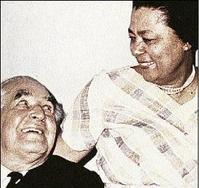
Lady Bustamante with Sir Alexander Bustamante, who died in 1977. Lady Bustamante celebrated her 96th birthday yesterday. - Photo by LMH Publishing Limited
KINGSTON, (JIS):
Yesterday, on March 8, International Women's Day, Lady Bustamante celebrated her 96th birthday.
This is quite fitting because she has been a defender of women's rights, as exemplified in her steadfast stance for port workers in 1938, alongside Alexander Bustamante.
Affectionately called 'Lady B', she is the widow of National Hero, the Rt Excellent Sir Alexander Bustamante, who was head of the Bustamante Industrial Trade Union (BITU), Leader of the Jamaica Labour Party (JLP), and the first prime minister of independent Jamaica in 1962.
Although not active these days, Lady B is still honorary treasurer of the BITU. She gives thanks to the Creator for her long life. "I thank God for sparing my life," she says.
Lifelong friend of Lady Bustamante, Seragh Lakersingh, in an interview with JIS News, speaks of her humility.
"Humility is the hallmark of her life. Even at the helm of the country, she remained humble. She was never swayed by positions and status; she was easily accessible. She was all things to all persons," he says.
General secretary of the BITU, George Fyffe, tells JIS News: "We all love Lady Bustamante and we wish her long life."
In her book, The Memoirs of Lady Bustamante, Lady B speaks glowingly of working quietly behind the scenes and beside her husband.
Secretary to Sir Alexander
Lady Bustamante, who studied commercial subjects at Tutorial College in Kingston, worked as a secretary to Sir Alexander, who she admired for his concern for the poor.
"I took up my job with pride and great expectations of becoming involved more with people than with paper and pencil," Lady Bustamante writes.
She was a private secretary to Bustamante from 1936, when he was a businessman, then a trade unionist and then a politician, until he became prime minister in 1962. "I was privileged to stand with Alexander Bustamante, behind him first, and beside him ever after," she says.
Lady Bustamante speaks of going with him, while she was in his employ, all across the country by car, oftentimes being his driver. "We went to remote little districts speaking to the people, seeing how they lived and noting their problems," she writes.
She also highlights a humorous side to Sir Alexander, revealing that she called him Mr 'B' and he pronounced her name 'Glad Ice', which reflected the close-knit relationship they shared.
In her memoirs, Lady Bustamante describes how she found herself fully involved in some of the most stirring events in 20th-century Jamaica. She recalls that on Monday, May 23, 1938, thousands of port workers took strike action and marched to Victoria Park to get direction from their leader, Sir Alexander, and during the upheavals, she found herself in the forefront of the action.
In the thick of trade unionism
"A series of unlikely events led me into the thick of trade unionism and politics. Before too long, I would become deeply involved in the movement to reform Jamaica. The folks at home would marvel at the fact that the quiet, Sunday-school organist from Ashton was in the forefront of national upheaval, fighting for the underpaid working class and the hungry unemployed. Almost all my working days have been spent in this service. Even now so late in life, I am still fully committed to trade unionism and I propose to continue that way until the breath has left my body," she writes.
Lady Bustamante puts modesty aside when she speaks of the women's role in the BITU at that time, even though she respected the men's input.
"We women were the mainstay of the union's organisation, though we could hardly have functioned without the brave men who toiled day and night, facing all sorts of criticism and opposition as they tried to help the workers. Bustamante was the busiest of us all, scouring the rural areas, forming branches, listening to grievances, offering solutions and calling publicly upon Government, as well as private employers, to deal fairly with the masses.
"On nearly all these trips, I was by his side taking note of important details, seeing to his personal welfare and offering advice based upon my own experience, close contact with the people, and, of course, a woman's intuition," she writes.
When Jamaica became independent in 1962, Lady Bustamante became Jamaica's first 'First Lady.' "He just announced to me that he was going to marry me," she writes.
This was a few months after the Jamaica Labour Party, which Bustamante had formed, won the general election, and Sir Alexander was sworn in as the first prime minister of Jamaica.
When Sir Alexander passed away on August 6, 1977, Lady Bustamante says she "was paralysed with grief." She, however, forced herself to stay active, still continuing to serve as treasurer of the BITU.

